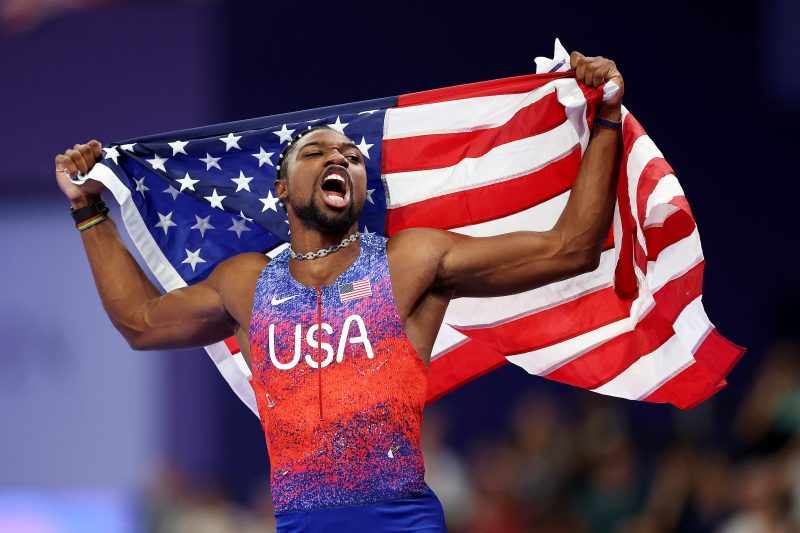
Does Noah Lyles have asthma? What to know of 100m winner at Paris Games
United States sprinter Noah Lyles solidified his stance as the fastest man in the world on Sunday, narrowly outrunning the field for the 100-meter sprint at the 2024 Paris Olympics.
Lyles, who became the first U.S. man to win a gold medal in the Olympic event since Justin Gatlin in 2004, beat out Jamaica’s Kishane Thompson in a photo finish. Lyles won the race by five thousandths of a second, running a 9.784 to Thompson’s 9.789.
The 27-year-old Lyles earned his first Olympic gold medal with the win, nabbing his second medal overall at the Olympics in the process.
Adding to the already-impressive nature of his accomplishment is the fact he was able to achieve it with a respiratory condition — one that would presumably make sprinting at the highest level the world can offer that much harder.
2024 Olympic medals: Who is leading the medal count? Follow along as we track the medals for every sport.
Here’s everything to know about Lyles’ asthma condition:
Does Noah Lyles have asthma?
Yes, Lyles experiences asthma — a respiratory condition that affects the airways in the lungs, causing a difficulty to breathe. He noted the condition on Sunday after his gold medal win.
Shortly after the win, Lyles posted to X, formerly known as Twitter, a message on what he has overcome to reach this moment.
I have Asthma, allergies, dyslexia, ADD, anxiety, and Depression,’ Lyles wrote. ‘But I will tell you that what you have does not define what you can become. Why Not You!’
Lyles has suffered from the condition since he was a child, which even caused him to be homeschooled, he told CNN in 2020.
“Asthma definitely affects kind of everything I do in terms of health, physical fitness, sometimes even emotional because if you’re emotionally fatigued, that can bring your immune system down,” Lyles told CNN at the time.
According to a July 31 report from ESPN, Lyles first experienced symptoms related to asthma at 3 years old, when he had coughing fits.
‘He couldn’t eat without coughing. He couldn’t play,’ Keisha Caine Bishop, Lyles’ mother, told ESPN. ‘His quality of life went down.’
ESPN reports that a doctor determined Lyles had reactive airway disease. It wasn’t until Lyles was 5 years old that he was diagnosed with asthma, which led his mother to make changes around their home and in his diet to reduce the risk of attack. Lyles had surgery to remove his tonsils and adenoids when he was 7 years old, significantly improving his quality of breath — and letting him play tag with his friends.
‘Everybody starts scattering, because they know that somebody’s about to be it, and it could be them at any moment that I choose,’ Lyles told ESPN.
Even as Lyles’ condition improved as he got older, asthma still adversely affected him, particularly after races. ESPN notes that, as a freshman in high school, Lyles would return home from competition exhausted, often causing him to miss school on Mondays to recover from races run over the weekend. In response, Lyles took vitamins and supplements to build up his lungs, following advice doctors gave his mother.
ESPN reports that, in 2016, Lyles’ asthma attacks ‘largely subsided’ due to supplements and USATF-approved medication.
What is asthma?
According to the National Heart, Blood and Lung Institute, asthma is defined as ‘a chronic (long-term) condition that affects the airways in the lungs. The airways are tubes that carry air in and out of your lungs. If you have asthma, your airways can become inflamed and narrowed at times. This makes it harder for air to flow out of your airways when you breathe out.’
The condition affects 1 in 13 people in the United States, according to data from the Centers for Disease Control and Prevention, and can affect people of all ages. As noted by the CDC, it often starts in childhood.
It has no cure, but can be mitigated with monitoring, trigger avoidance and medication.
Noah Lyles photo finish
Lyles won the 100-meter at the 2024 Paris Olympics in a photo finish on Sunday, narrowly beating Jamaica’s Thompson (silver medal) and the United States’ Fred Kerley (bronze).
Here’s the photo-finish result and the times by each runner:
1. Noah Lyles (9.784 seconds)
2. Kishane Thompson (9.789 seconds)
3. Fred Kerley (9.81 seconds)
